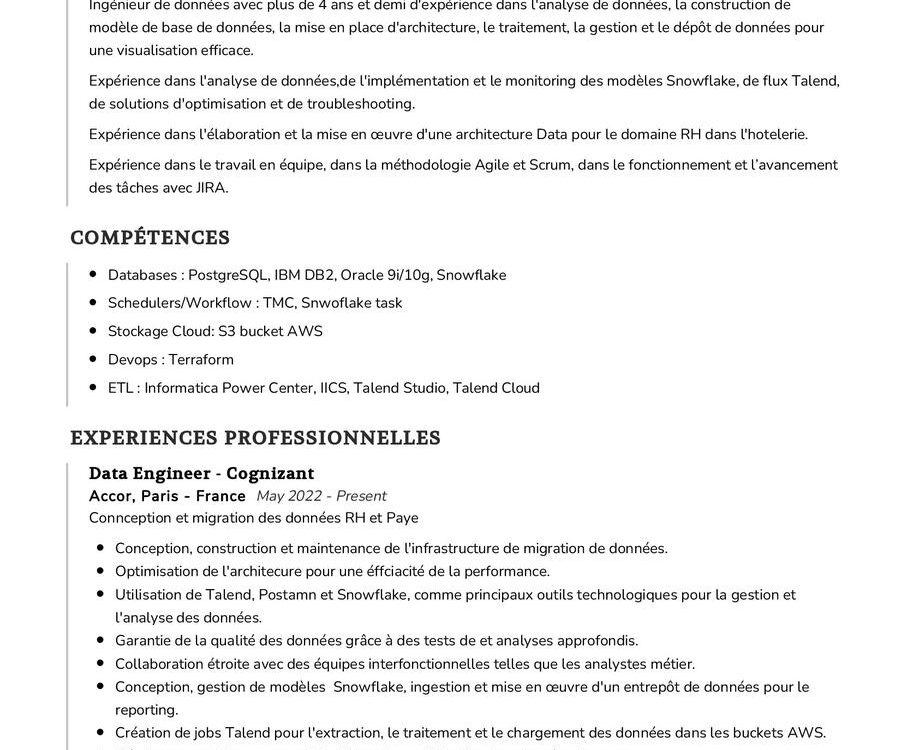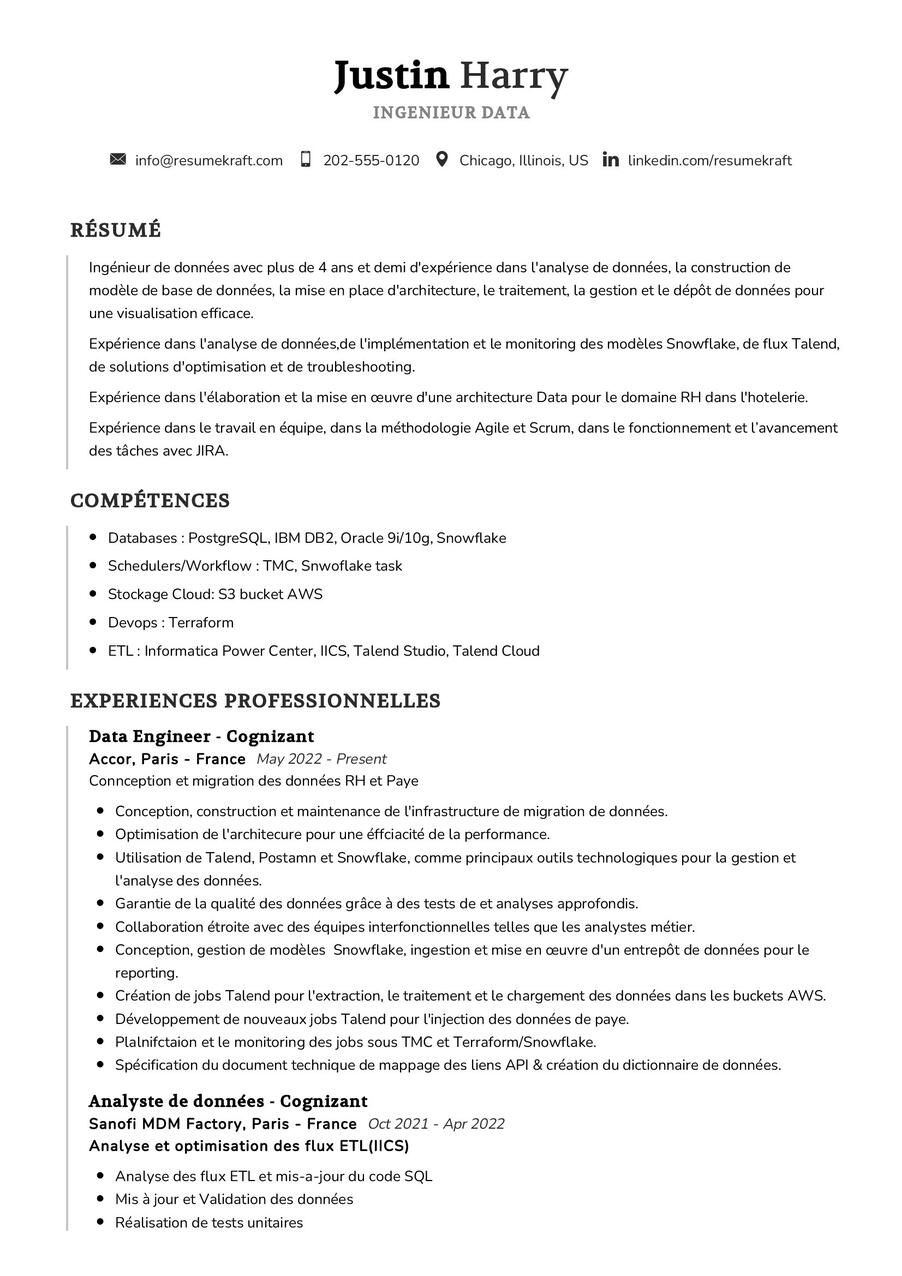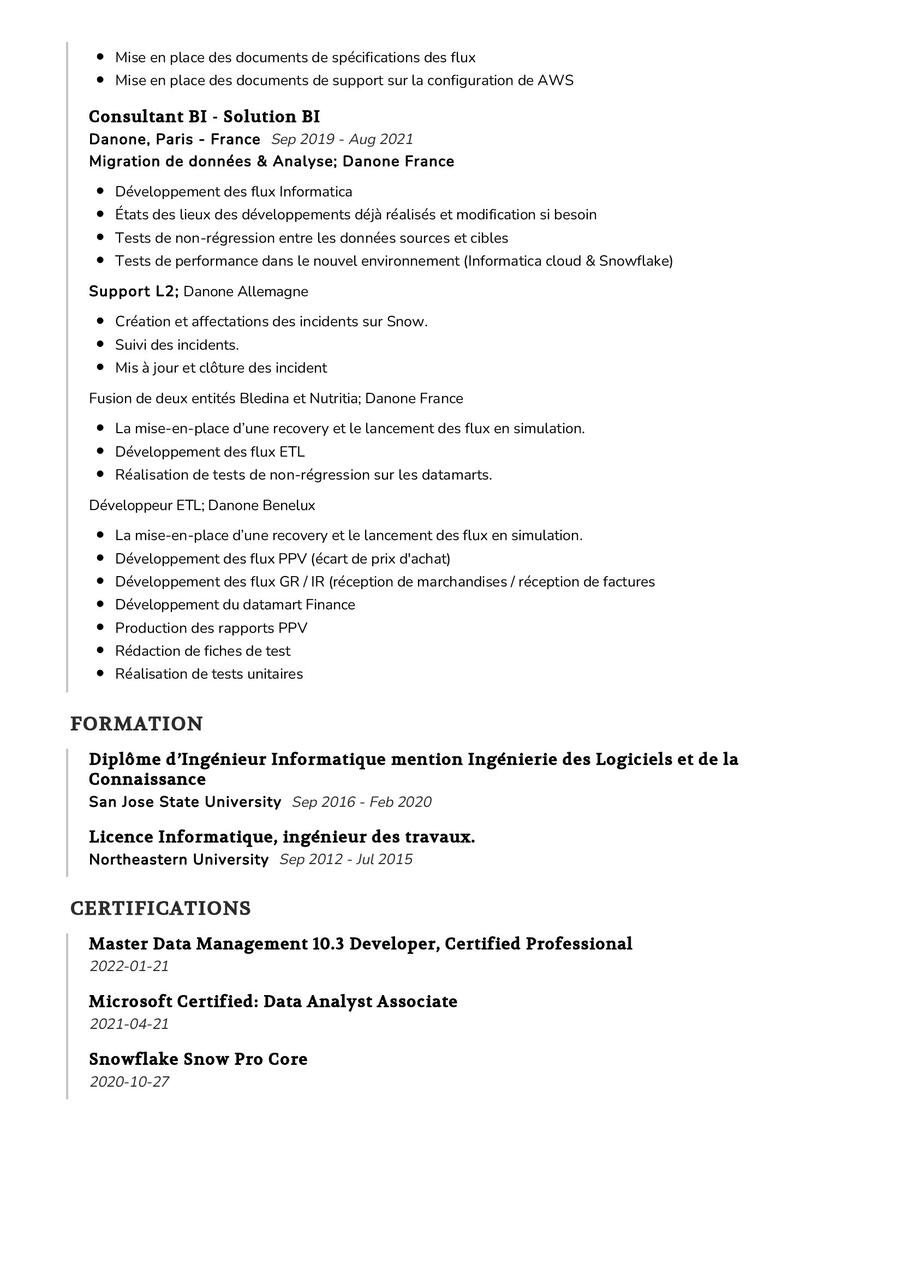Unlocking Opportunities: The Role of a Data Engineer
As the digital landscape continues to thrive on data, the role of a Data Engineer has become indispensable in shaping the technological backbone of organizations. A Data Engineer is not just a technical wizard but a pivotal force in crafting efficient data pipelines and systems. In this article, we’ll delve into the multifaceted responsibilities, required skills, and tips on how to create a compelling CV for aspiring Data Engineers.
What is the Role of a Data Engineer?
A Data Engineer plays a crucial role in designing, developing, and maintaining the architecture that allows for the processing of vast amounts of data. They are the architects behind data systems, ensuring that information flows seamlessly from source to destination. Let’s explore the intricate role of a Data Engineer, a position that demands a combination of technical prowess and innovative problem-solving.
Responsibilities of a Data Engineer encompass:
- Designing and implementing scalable data infrastructure.
- Creating and maintaining optimal data pipeline architecture.
- Collaborating with data scientists and analysts to understand data needs.
- Ensuring data security, integrity, and accessibility.
- Optimizing data flow and collection for cross-functional teams.
- Developing data set processes for data modeling, mining, and production.
- Providing ongoing support and troubleshooting for data-related issues.
A Data Engineer is the unsung hero behind the scenes, laying the groundwork for data-driven decision-making.
What are the Data Engineer Job Requirements?
Becoming a Data Engineer requires a blend of educational background, technical expertise, and problem-solving skills. Let’s delve into the prerequisites for aspiring Data Engineers:
- A Bachelor’s or Master’s degree in Computer Science, Information Technology, or a related field.
- Proficiency in programming languages such as Python, Java, or Scala.
- Experience with big data technologies like Hadoop, Spark, or Kafka.
- Strong database knowledge, including SQL and NoSQL databases.
- Understanding of data modeling, ETL processes, and data warehousing.
- Excellent problem-solving and analytical skills.
- Effective communication skills for collaborating with cross-functional teams.
Acquiring certifications in relevant technologies can enhance your CV and showcase your commitment to staying abreast of industry trends.
Responsibilities of a Data Engineer
The role of a Data Engineer is dynamic, requiring a skill set that goes beyond technical proficiency. Let’s unravel the core responsibilities that define this role:
- Designing and implementing scalable data infrastructure.
- Collaborating with data scientists and analysts to understand data requirements.
- Ensuring data quality, integrity, and security.
- Optimizing data processes for efficiency and accuracy.
- Building and maintaining ETL pipelines for data transformation.
- Troubleshooting and resolving data-related issues in a timely manner.
- Staying updated with emerging trends in data engineering and implementing best practices.
Each responsibility is a testament to the Data Engineer’s ability to navigate the complexities of data management.
Data Engineer CV Writing Tips
Your CV is your ticket to securing a role as a Data Engineer. Here are some tips to craft a CV that stands out in the competitive job market:
- Highlight your educational background and degrees prominently.
- Detail your hands-on experience with programming languages and big data technologies.
- Showcase specific projects where you’ve optimized data processes or resolved complex issues.
- Quantify your achievements with metrics, emphasizing the impact of your contributions.
- Include relevant certifications to validate your skills and commitment to professional development.
Your CV is not just a document; it’s a narrative of your journey as a Data Engineer, so make it compelling and impactful.
Data Engineer CV Summary Examples
Your CV summary is the first impression you make on potential employers. Craft a powerful snapshot of your experience, skills, and value with examples like:
- “Data Engineer with a Master’s in Computer Science and expertise in optimizing data pipelines, contributing to a 30% increase in data processing efficiency.”
- “Results-driven Data Engineer with hands-on experience in Hadoop and Spark, leading successful data migration projects.”
- “Detail-oriented Data Engineer specializing in data quality assurance, ensuring the integrity and accuracy of organizational data.”
Your CV summary sets the stage for a deeper exploration of your qualifications and achievements.
Create a Strong Experience Section for Your Data Engineer CV
Your experience section is the heart of your CV, showcasing your journey and accomplishments. Here are examples to guide you:
- “Led the development of a scalable data infrastructure, resulting in a 25% improvement in data retrieval speed.”
- “Collaborated with cross-functional teams to implement a real-time data processing solution, enhancing decision-making capabilities.”
- “Resolved complex data integrity issues, ensuring compliance with industry standards and regulations.”
Each experience entry should highlight your impact on projects and the value you bring to the table as a Data Engineer.
Education Section for Your Data Engineer CV
Your educational background is a cornerstone of your CV. Showcase your academic achievements like:
- Master of Science in Computer Science, XYZ University, 2019.
- Bachelor of Technology in Information Technology, ABC University, 2017.
- Cloudera Certified Data Engineer, validating expertise in big data technologies, 2020.
Each educational qualification is a testament to your dedication to continuous learning and professional development.
Data Engineer Skills for Your CV
Your skill set is your arsenal, showcasing your abilities as a Data Engineer. Highlight essential soft and hard skills:
Soft Skills:
- Analytical thinking, the ability to dissect complex problems.
- Communication skills, translating technical jargon into understandable insights.
- Team collaboration, working seamlessly with data scientists, analysts, and other stakeholders.
- Adaptability, staying agile in a rapidly evolving data landscape.
- Attention to detail, ensuring data accuracy and reliability.
Hard Skills:
- Proficiency in programming languages: Python, Java, Scala.
- Experience with big data technologies: Hadoop, Spark, Kafka.
- Database knowledge: SQL, NoSQL.
- Data modeling and ETL processes.
- Cloud platforms: AWS, Azure, GCP.
Each skill is a tool, empowering you to navigate the complexities of data engineering successfully.
Common Mistakes to Avoid When Writing a Data Engineer CV
Steer clear of common pitfalls when crafting your Data Engineer CV to enhance your chances of landing the desired role:
- Avoid using generic terms; tailor your CV to the specific job description.
- Quantify your achievements; don’t just list responsibilities without showcasing your impact.
- Include a cover letter to provide a personalized touch to your application.
- Balance technical details; ensure your CV is accessible to non-technical HR professionals.
- Proofread meticulously to present a polished and professional image.
Avoiding these mistakes will contribute to creating a CV that resonates with potential employers.
Key Takeaways for Your Data Engineer CV
As you conclude crafting your Data Engineer CV, keep these key points in mind:
- Emphasize your educational background and relevant certifications.
- Highlight specific projects and achievements to demonstrate your practical experience.
- Quantify your impact with metrics to showcase the tangible results of your contributions.
- Include a skills section to highlight your proficiency in both technical and soft skills.
Your CV is your professional story, so make it compelling, tailored, and impactful. Now, unleash your potential as a Data Engineer with confidence.
Finally, feel free to utilize resources like AI CV Builder, CV Design, CV Samples, CV Examples, CV Skills, CV Help, CV Synonyms, and Job Responsibilities to create a standout application and prepare for the Data Engineer job interview.



